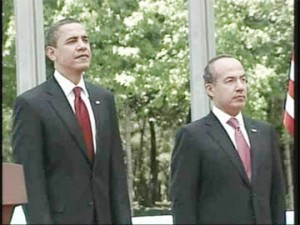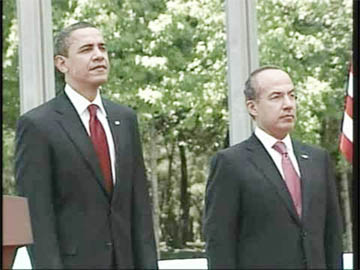‘All Obama, all the time’
Wayne Brown is a well-known Trinidadian writer and columnist who now lives in Jamaica. This is the 21st in his new series on the Obama era.
That headline, cribb-ed from a headline by Politico’s Roger Simon, represents a fair guess as to how the Summit of the Americas, held over the weekend in Port of Spain, turned out. (It’s merely a guess, of course, since, due to that infelicity of deadlines that occasionally occurs, this column is being written in advance about an event, the outcome of which will probably be known to the reader by the time it appears.)
Simon wasn’t exactly complaining. “If it’s Thursday,” he wrote tongue-in-cheek, “it must be Obama. Or Friday. Or Saturday. Or just about any day. Barack Obama has gone from being historic to being ubiquitous. He doesn’t just control the news cycle, he is the news cycle.
“Need an auto exec fired? A pirate killed? A dog patted? A Cuba policy addressed? An Easter egg rolled? An economy stimulated? Hey, he also does Seders!”
And Simon went on to compare Obama’s seemingly inexhaustible energy to Bush’s “speechlessness” in his first 100 days in office, “even though [Bush] had to deal with an international crisis (the Chinese government took 24 Americans hostage) and a domestic crisis (race riots in Cincinnati).”

Simon might have paid attention instead to what Cheney was doing in his first 100 days — including holding his infamous meeting with the heads of America’s oil giants, at which — to the greater glory of these behemoths’ balance sheets, and with complete disregard for the wellbeing of Americans, to say nothing of the peace of the world — the energy-cum-foreign policy of the new Bush administration was secretly plotted. (Yes, they already had Iraq in their sights.)
But certainly Obama has begun his tenure like a Whirling Dervish. And who can blame him, when his best argument on behalf of virtually every aspect of both his foreign and domestic agendas appears to be himself?
Reported the NYT on Friday:
“When President George W. Bush traveled to Argentina four years ago for a gathering of Latin American leaders, protesters smashed windows, looted stores and sang anti-Bush slogans… Mr. Bush was the most unpopular American president ever in Latin America, polls showed, while Mr. Obama has rock-star status throughout the hemisphere…”
And the Times went on to quote a Trinidadian street vendor:
“Yes, there are other leaders coming, but people do not understand that, they only concerned about Obama,” said Kenneth Job. “He is the main man who everybody love and want to see.”
Moreover, Obama — ever the political animal, and ever exhaustive in his preparation —had gone to pains to prepare for the summit, meeting individually beforehand with all the key Latin American players, and capping that by planting his own editorial on Friday in several regional papers (including the Trinidad Express).
“As we approach the Summit of the Americas,” wrote Obama, “our hemisphere is faced with a clear choice. We can overcome our shared challenges with a sense of common purpose, or we can stay mired in the old debates of the past. For the sake of all our people, we must choose the future.”
(How many readers, one wonders, realized that this was a false choice — exactly like Obama’s controversial decision, in fact, to end the Bush administration’s torture policies while, in the name of looking to the future, immunizing from prosecution those who carried them out — and that resolving “the old debates of the past” was integral to achieving “a sense of common purpose” in future?)
And Obama went on to plug his relaxation last week of restrictions on family travel and remittances by Cuban-Americans to Cuba.
Interestingly, he seemed also to hold out an olive branch to Venezuela’s Chávez. “The U.S.-Cuba relationship is one example,” Obama wrote, “of a debate in the Americas that is too often dragged back to the 20th century. To confront our economic crisis, we don’t need a debate about whether to have a rigid, state-run economy or unbridled and unregulated capitalism − we need pragmatic and responsible action that advances our common prosperity. To combat lawlessness and violence, we don’t need a debate about whether to blame right-wing paramilitaries or left-wing insurgents − we need practical cooperation to expand our common security.”
In other words: “I won’t attack your political philosophy, Hugo, if you don’t attack mine.”
It’s going to be fascinating to see if Chávez (in a weaker position today than he was in 2005, since Bush was Bush, Obama is Obama, and in the interim the price of oil has collapsed) says in effect, “You gotta deal.”
Certainly, if Chávez takes his cue from his mentors, the Castros, he’ll at least temper his fire. Reported Yahoo on Friday: “Obama’s move this week to ease travel and some other restrictions for Cuban-Americans brought an unprecedented reply from Havana. Raul Castro offered to talk to the Obama administration about all outstanding grievances. [In Chavez’s presence] Castro declared: “We have sent word to the US government… that we are willing to discuss everything — human rights, freedom of the press, political prisoners, everything.”
That’s a startling and, potentially, hugely fecund break from past Cuban responses (invariably, ‘Mind your own business’); and Obama administration officials, reported Yahoo, were “trying to determine what to make of the development.”
This weekend Obama is sure to have come under pressure from Latin American leaders to go a lot further and end the silly and spiteful US trade embargo against Cuba. But by last Thursday, Obama — ever cautious, ever testing the temperature of his domestic political waters — was already putting on the brakes. One step at a time, he told reporters in Mexico; further easing of restrictions would depend on Havana sending “signals that they’re interested in liberalizing.”
And what if the summit’s leaders replied that Raúl Castro has just given him such a signal?
Then Obama will leave Port of Spain with, once again, that curious schism between his personal popularity and conferees’ dissatisfaction with his policies.

